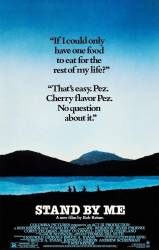Trivia: During the production of Stand By Me, director Rob Reiner did not want the film to be called The Body (the same name of the short story by Stephen King). He believed that if he did, people would confuse it with a documentary on body building, a porno film or another Stephen King horror novel. It was changed to Stand By Me because while thinking of a title, it was considered to be the least unpopular name.
Trivia: While filming the scene in which Ace takes Gordie's Yankees cap, Kiefer Sutherland's first instinct was to put it on, rather than hand it to Eyeball Chambers.
Trivia: While practising his lines, Jerry O'Connell was incredibly impressed that, as an 11-year old, he was being allowed to swear.
Trivia: While filming the scene in which Vern and Gordie are being chased by a train, director Rob Reiner couldn't get Jerry O'Connell and Wil Wheaton to look scared enough, so he proceeded to yell at them until they began to cry, then filmed the scene again.
Trivia: 237 is a number that appears in quite a few Stephen King stories. This explains why the boys get $2.37 when they add up their money.
Trivia: The name "Milo Pressman" was later used in the first season of Kiefer Sutherland's television series "24."
Trivia: Kiefer Sutherland stayed in character off-camera by often picking on Wil Wheaton, River Phoenix, Corey Feldman, and Jerry O'Connell.
Trivia: The character of Ray Brauer is based on a real friend of Stephen King's who died in a motorcycle accident when he was about 20 years old. His name was Raymond Von Brauer, and his full name also appears in the Stephen King short story that this film is based on, titled: "The Body"
Trivia: The Railroad bridge is just north of Burney, CA.
Trivia: The leeches were real.
Trivia: The incident of Chris stealing the milk money was based on a real-life incident in author Stephen King's life. According to King, the milk money was stolen and a kid that he went to school with and was known for having a bad reputation was immediately accused of stealing it. The kid who was accused was upset that he was blamed for the theft even though there was no proof that he did it.
Trivia: After Rob Reiner showed the movie to Stephen King, he noticed he was shaking. After the film was over, King left the room. When he returned he said that this was the best adaption of his work he'd ever seen.






Answer: No, it wasn't that big of a train. He didn't even attempt to get off the throttle. That's all it would have taken for the boys to make it fairly easy. It was a straight-away track, no chance of it derailing by hitting the brakes. Like the man said above, if trains derailed that easily, we wouldn't be using them.